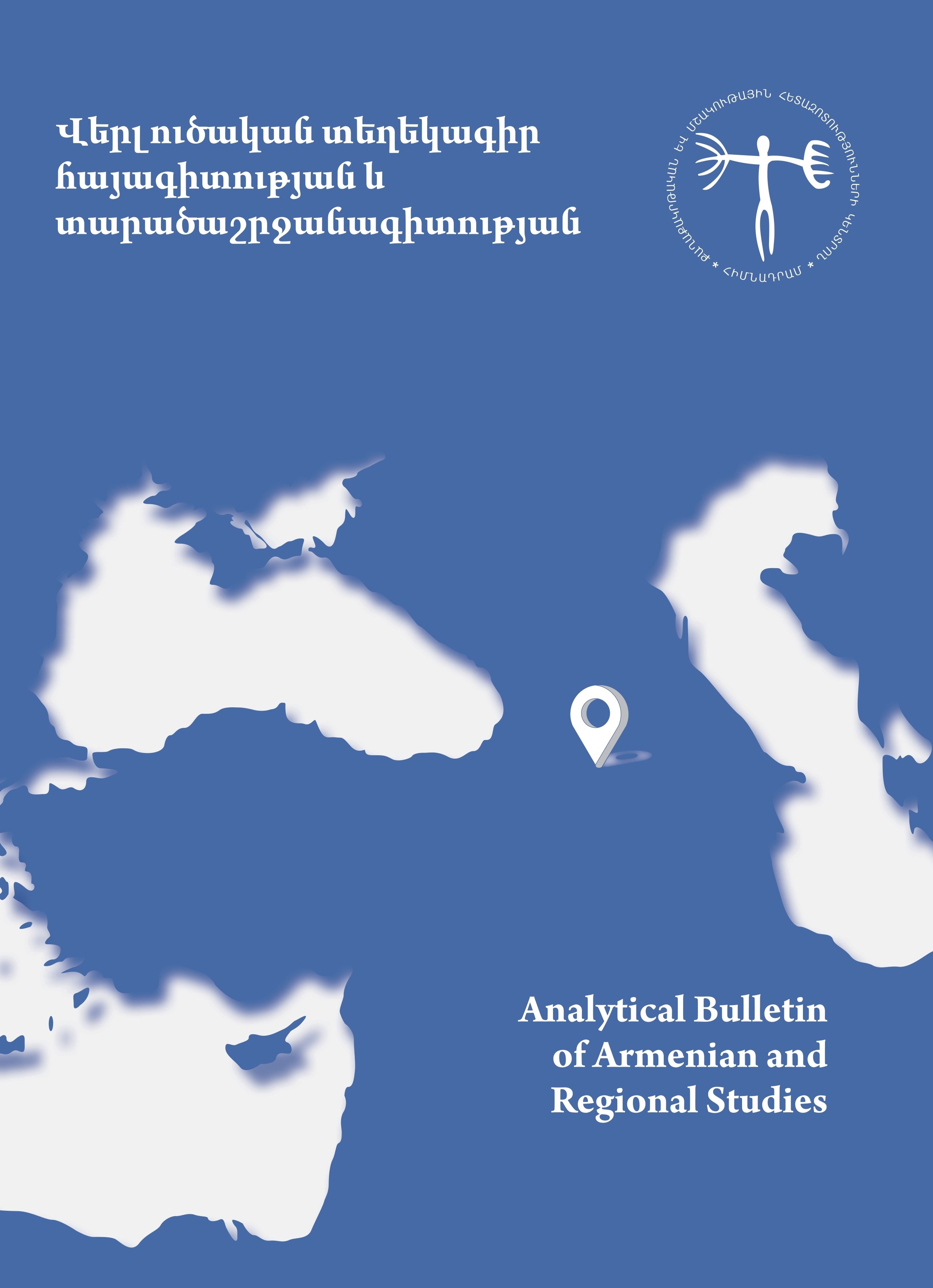Understanding Europeanization in Georgia and Armenia - Discourses, Perceptions and the Impact on Bilateral Relations
Keywords:
Europeanization, Armenia, Georgia, EU, Association agreement, Russia, Customs Union, EurAsEC, discourses, bilateral relationsAbstract
Post-Soviet Georgia and Armenia have a long history of cooperation with the European Union (EU). With the aim of deepening bilateral ties with the EU, both countries were included in the Eastern Partnership (EaP) program. Since 2009, the European Union began negotiating the Association Agreement, including a Deep and Comprehensive Free Trade Area (DCFTA) with Georgia and Armenia. Several reforms have been conducted to converge their policy to that of the European Union. But the geopolitical climate has changed significantly.
On 3 September 2013, when the Agreement was finalized in Armenia, Serzh Sargsyan, President of the Republic of Armenia, made an unexpected announcement about the decision to join the Russian-led Eurasian Customs Union instead of signing an Association Agreement with the EU. Armenian membership in the EurAsEC Customs Union would be incompatible with the agreements negotiated with the EU1. Thus, the Armenia–EU Association Agreement was called off by Armenia in early September 2013, though a revised agreement is still under consideration. Unlike Armenia, EU membership still stays the top priority in the Georgian political agenda and Georgia signed the EU association agreement in 2014.
Despite these geopolitical changes, both Armenia and Georgia are continuing their Europeanization and European integration.
This paper investigates how Europeanization is perceived in Armenia and Georgia, and the different impetuses of Europeanization in the two countries. The research aims to analyze the extent to which the understanding of Europeanization affects Georgia-Armenia bilateral relations. The study shows that Europeanization seems to be an effective tool for the convergence of Georgian and Armenian policies despite the fact that the essence of Europeanization is substantially different in both countries. The research also aims to show how some fields in Armenia “have suffered” as a result of the decision not to sign the Association Agreement. However, the analysis does not reflect the complete picture as it is too early to give a precise assessment, since Armenia and the EU are in an ongoing negotiation over a modified association agreement.
References
Rettman. A., Armenia to join Russia trade bloc, surprises EU, EUObserver, September 3, 2013, https://euobserver.com/foreign/121304 (accessed on 04.08.2015)
Ugur M., Europeanization, EU conditionality and governance quality: Empirical evidence on Central and Eastern European countries // International Studies Quarterly.2012, p. 41 https://www.researchgate.net/publication/256023612_Europeanization_EU_Conditionality_and_Governance_Quality_Empirical_Evidence_on_Central_and_Eastern_European_Countries (accessed 04.08.2015)
Ladrech R., Europeanization of Domestic Politics and Institutions: The Case of France // JCMS: Journal of Common Market Studies, 32:, 1994, p70
Schimmelfennig F., “Europeanization beyond Europe” // Living Reviews in European Governance 2:1, 2007, p 3. http://www.livingreviews.org/lreg-2007-1 (accessed 04.08.2015)
Solonenko I., Shapovalova N., Is the EU’s Eastern Partnership promoting Europeanisation?. policy brief. FRIDE, September no 97, 2011, p. 2. http://fride.org/download/PB_97_EaP.pdf (accessed 04.08.2015)
Kratochwil F., Ruggie J. G., International Organization: A State of the Art on an Art of the State // International Organization, Vol. 40, No. 4 (Autumn, 1986), p 767-769
Bulmer S., Radaelli C., The Europeanization of National Policy? // Queen’s Papers on Europeanisation, No 1, 2004, p.4
EU-Armenia Action plan 2015, 1: http://eeas.europa.eu/enp/pdf/pdf/action_plans/armenia_enp_ap_final_en.pdf, (accessed 10.08.2015)
EU in Armenia: “EU Centre Opens Door” http://eucentre.am/eu-centre-opensdoor/, (accessed 10.08.2015)
Armenia Chooses Russian Trade Deal over the EU, September 2013, http://www.rt.com/business/russia-armenia-customs-eu-391/ (accessed 01.08.2015)
World Bank, Migration & Remittances Data, http://econ.worldbank.org/WBSITE/EXTERNAL/ EXTDEC/EXTDECPROSPECTS/0,,contentMDK:22759429~pagePK:64165401~piPK:64165026~theSite PK:476883,00.html#Remittances (accessed 10.08.2015)
ARKA News Agency, “Electricity price to rise from 30 to 38 drams per kilowatthour in Armenia”, 24.05.2013, http://arka.am/en/news/economy/electricity_price_to_rise_from_30_to_38_dramsperkilowatt_hour_in_armenia/ (accessed 10.08.2015)
The Washington Post, “Why Armenia turned to Russia instead of the West”, 07.05.2015, https://www.washingtonpost.com/blogs/post-partisan/wp/2015/05/07/why-armenia-turned-to-russia-instead-of-the-west/, (accessed 10.08.2015)
Gauging opinion: New survey in Armenia shows 64-percent approval for Customs Union accession, ArmeniaNow.com, 27.11.2013, http://www.armenianow.com/news/50405/armenia_russia_customs_union_gallup_public_opinion_survey (accessed 30.08.2015)
ENPI Barometer: Taking the EU Pulse in the Eastern Neighborhood, EastBook.eu. 03.05.2013, http://www.eastbook.eu/en/2013/05/country-en/polanden/enpi-barometer-taking-the-eu-pulse-in-the-eastern-neighbourhood/. (accessed 30.08.2015)
Personal Interview with Arman Navasardyan, RA former Foreign Deputy Minister, Ambassador Extraordinary and Plenipotentiary, interviewed by the author. June 2015, Yerevan
Eurasianet.org: “Russian Officer: We Would Intervene In Karabakh Against Azerbaijan”, 1.11.2013, http://www.eurasianet.org/node/67712, (accessed 10.08.2015)
Joint Declaration of the Eastern Partnership Summit, Vilnius, 28-29 November 2013. http://www.euronest.europarl.europa.eu/euronest/webdav/site/mySite/shared/general_documents/eap_summit/2013-11-28-joint-declaration.pdf (accessed 01. 08.2015)
European Union External Action: Press Release: “EU and Armenia launch negotiations for a new agreement”, 07.12.2015, http://eeas.europa.eu/statementseeas/2015/151207_04_en.htm, (accessed 07.12.2015)
Personal Interview with Artur Najaryan, President of Youth Initiative Center NGO, interviewed by the author, June 2015, Yerevan
Mediamax: “Traian Hristea: Relations with the EU: what do they mean for Armenians?”, 04.08.2015, http://www.mediamax.am/en/news/foreignpolicy/15014/, (accessed 10.08.2015)
Personal Interview with Mikayel Hovhannisyan, Expert in European studies, European Integration and EU Eastern Partnership project, interviewed by the author. May 2015, Yerevan.
Personal Interview with Heghine Manasyan, Executive Director of “CRRCArmenia”, interviewed by the author, June 2015, Yerevan
Delegation of the European Union to Armenai: Political and Economic Relations, http://eeas.europa.eu/delegations/armenia/eu_armenia/political_relations/index_en.htm, (accessed 10.08.2015)
Opinion: Georgia's European quest: a question of stamina, Commonspace.eu, May 2015, http://commonspace.eu/eng/news/6/id3271 last seen 04.08.2015 (accessed 04.08.2015)
Georgia beyond EU and Russia, lincolnmitchell.com, July 2015. http://lincolnmitchell.com/georgia-analysis/2015/7/8/georgia-beyond-europe-andrussia(accessed 04.08.2015)
Minesashvili S., How European Are We? Explaining Georgia’s Westward Aspiration // Center for Social Science working paper, 2012, p. 6. http://css.ge/files/documents/Papers/Research_paper_Salome_Minesashvili_(1).pdf (accessed 04.08.2015)
Nodia G., The Georgian Perception of the West // Coppieters B., Zverev A. and Trenin D. (eds.), Commonwealth and Independence in post-Soviet Eurasia. London-Portland, 1998, p.13
Jones S., The Role of Cultural Paradigms in Georgian Foreign Policy // Journal of Communist Studies and Transition Politics, 19(3) 2003, pp.91-93
Rondeli A., The Choice of Independent Georgia // Chuffrin Genady (eds) The Security of The Caspian Sea Region, Stockholm International Peace Research Institute, 2002, p 196-197
Foreign Policy Strategy of Georgia, 2003, p 21
Annual Report of the President of Georgia, 2015
Bolkvadze K., Naylor R., Popular and Elite Perceptions of the EU in Georgia // Bachmann V., Muller M.,(eds.) Perceptions of the EU in Eastern Europe and Sub-Saharan Africa: looking in from the outside. New Yourk: Pagvilan Macmillan Press, 2015, p. 112
Personal interview with Pataraia Tamar, Head of the European and Euro-Atlantic Cooperation Program at the Caucasian Institute for Peace, Democracy and Development, interviewed by the author, July 24, 2015, Tbilisi
Gogolashvili K., The South Caucasus: The European Future // The South Caucasus 2018 Facts, Trends, Future Scenarios, Konrrd Adenauer Stiftung e.V, 2013, p. 362
Kakachia K., Georgian Politics in Transition: Trends and Obstacles For Potential Transformation // The South Caucasus 2018 Facts, Trends, Future Scenarios, Konrrd Adenauer Stiftung e.V, 2013, p 44-45
Bengtsson R., Elgström O., Conflicting Role Conceptions? The European Union in Global Politics // Foreign Policy Analysis, Vol 8 (1), January 2012, p 105
Knowledge and Attitudes toward the EU in Georgia, Caucasus Research Resource Centers (CRRC). 2011, p 26-27 http://www.crrc.ge/uploads/files/research_projects/EU_Report_FINAL_Jan25.2012_ENG.pdf. (accessed 04.08.2015)
National Democratic Institute (NDI) Poll, Georgia. August 2014. https://www.ndi.org/Georgia_poll_2014. (accessed 04.08.2015)
Personal interview with Gotsadze Elene, Director of Information Center on NATO and EU, interviewed by the author, July 29, 2015, Tbilisi





